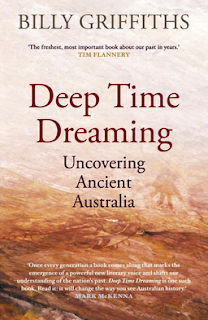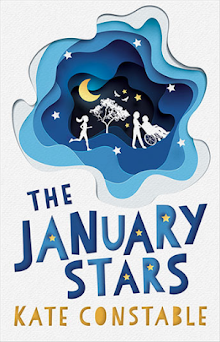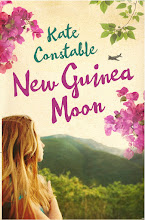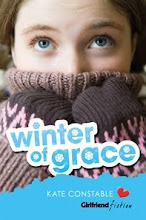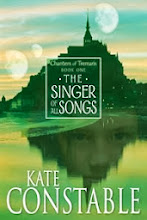Stranger In The House makes an interesting companion read to Julie Summers' book on the Women's Institute, Jambusters. This earlier book is shorter and less densely packed with research, but makes up for it with its moving first-hand stories from women who had to cope with either the loss of their men during World War II, or their return, irreparably changed: mothers, widows, wives, children and grand-children. Some men were physically wounded, most were psychologically affected. Some couples found the disruption of the war years impossible to adjust to. Hardest hit were the prisoners of war, particularly the prisoners of the Japanese.
Every year when Anzac Day rolls around, I'm prompted to reflect on what those big wars mean to me. I don't have a relative who fought or was any way involved in combat. It's startling to realise that when I was born, the end of WWII was far closer than my university years are to me now -- and they seem like only yesterday.
Sometimes it feels as if Australia's participation in the First and Second World Wars (especially the First) is our nation's only history -- or at least the only portion of our history which we are prepared to face and explore head-on. Pre-settlement history is largely a blank to most Australians; the post-invasion century is largely too painful to be honestly examined. But we can be proud of our diggers, and more proud, weirdly, when they lost (eg Gallipoli) -- because they were valiant without actually defeating anyone? I don't know.
Anyway, these British women were certainly valiant too, and so were the Australian women who shared the same experience, shockingly without any official support or assistance. Most suffered and coped in silence. Speaking of university days, it was nice to see the work of a friend from long ago, Dr Joy Damousi from Melbourne Uni, cited by Summers.
Lest we forget.
30.4.18
22.4.18
King of Shadows
For some reason, it hadn't really occurred to me that Susan Cooper might have written other books after she finished the superb Dark Is Rising series. Luckily for me, she did, and the first one I've laid my hands on is King of Shadows. Time slip! Shakespeare! Two of my favourite things! So I knew I was onto a winner.
And it is. Nat Field, a young American actor brought over to London to play in the 'new' Globe theatre, wakes up one morning to find himself not just in Shakespeare's London, but part of Shakespeare's company. Cooper manages with a light touch to evoke the atmosphere of Elizabethan times and the bustling but much smaller city, and also weaves in Nat's emotional journey with a gently political plot.
It was a little disorienting to read yet another version of William Shakespeare, having recently re-read Antonia Forest's The Players and the Rebels, which covers much of the same ground and characters (the clown Will Kempe, distinguished actor Richard Burbage etc), and even watching the Doctor Who episode, The Shakespeare Code, filmed in the Globe itself. All these different versions of Will's world, overlapping, contradicting, reinforcing, much as the different iterations of Shakespeare's play echo down the centuries. But I can't help feeling that Will himself would approve.
And it is. Nat Field, a young American actor brought over to London to play in the 'new' Globe theatre, wakes up one morning to find himself not just in Shakespeare's London, but part of Shakespeare's company. Cooper manages with a light touch to evoke the atmosphere of Elizabethan times and the bustling but much smaller city, and also weaves in Nat's emotional journey with a gently political plot.
It was a little disorienting to read yet another version of William Shakespeare, having recently re-read Antonia Forest's The Players and the Rebels, which covers much of the same ground and characters (the clown Will Kempe, distinguished actor Richard Burbage etc), and even watching the Doctor Who episode, The Shakespeare Code, filmed in the Globe itself. All these different versions of Will's world, overlapping, contradicting, reinforcing, much as the different iterations of Shakespeare's play echo down the centuries. But I can't help feeling that Will himself would approve.
21.4.18
Musicophilia
I've been learning piano for a couple of years now, and I borrowed Musicophilia from my teacher (composer Chris McCombe, who has been my dear friend since we met at college thirty-three years ago). I'm the first to admit that I am not, and never have been, a musical person, despite my debut novel being The Singer of All Songs. I've never learned an instrument, and while I love to belt out a Christmas carol or an eighties pop song in the car, I can barely hold a tune. Working in the industry for a decade and a half has put me off going to see bands, or even listening to music on the radio.
And yet I've loved learning, in my stumbling way, to pick out tunes on the keyboard, discovering how chords fit together, the mysterious interaction between mathematical precision and soaring emotion that music can engender. When I'm sight-reading a new piece, I can feel the gears of my brain grinding as I try to relate the marks of the notes on the page, to the movements of my fingers on the keys, and the sounds I can hear. A whole rich and complex world has opened up before me, even if I'm only capable of appreciating a tiny slice of it.
Oliver Sacks led an intensely musical life; these relationships which are still mysterious to me are a world through which he moved with confidence and ease. This dense but lively book explores the interaction between music and the brain from many fascinating angles: from the ability of some aphasiacs to sing the songs of their past, though they can't utter a spoken word (sadly, this hasn't worked with my father), to musical savants, and those who suddenly gain or lose musical ability or obsession after a neurological event. At one point Sacks makes a comment about 'the music that runs through our heads all day', and I thought indignantly, not through mine! But I've since realised that I do indeed have music running through my head most of the day, without even knowing it.
My musical journey has a long way to go, but I enjoyed this glimpse into a strange, rational, yet mysterious world.
And yet I've loved learning, in my stumbling way, to pick out tunes on the keyboard, discovering how chords fit together, the mysterious interaction between mathematical precision and soaring emotion that music can engender. When I'm sight-reading a new piece, I can feel the gears of my brain grinding as I try to relate the marks of the notes on the page, to the movements of my fingers on the keys, and the sounds I can hear. A whole rich and complex world has opened up before me, even if I'm only capable of appreciating a tiny slice of it.
Oliver Sacks led an intensely musical life; these relationships which are still mysterious to me are a world through which he moved with confidence and ease. This dense but lively book explores the interaction between music and the brain from many fascinating angles: from the ability of some aphasiacs to sing the songs of their past, though they can't utter a spoken word (sadly, this hasn't worked with my father), to musical savants, and those who suddenly gain or lose musical ability or obsession after a neurological event. At one point Sacks makes a comment about 'the music that runs through our heads all day', and I thought indignantly, not through mine! But I've since realised that I do indeed have music running through my head most of the day, without even knowing it.
My musical journey has a long way to go, but I enjoyed this glimpse into a strange, rational, yet mysterious world.
Labels:
book response,
music,
non-fiction,
science
18.4.18
The Shape of Three
Excuse the ropy photo: couldn't find one on the internet and the dog jiggled me as I was taking this one. I've never read any Lilith Norman books, but I was alerted to her by a reference to a novel of hers called The Fire Takers which is about some supernatural force sucking the creativity out of an artistic family -- that sounds interesting! I see now that she once worked under Patricia Wrightson at The School Magazine, and that she died last year, aged 90.
Anyway, The Shape of Three is not all supernatural. Written in 1971, it concerns two Australian families whose lives painfully collide, entangle and then fall apart when it's discovered that two of their children were accidentally swapped at birth (not a spoiler -- the reader guesses this on the very first page, then has to wait about four chapters for everyone else to catch up).
This book, despite its rich premise, has dated very badly. There is legal action, off screen, but the decision to swap the two boys back is apparently taken without any support or assistance from any agency -- I can't imagine this happening today without an army of psychologists, social workers, school counsellors and other support services being involved. The boys' respective schools aren't even told what's going on, and the only counselling one of the boys receives is a brief chat with a local priest (in itself probably not likely to happen these days without an observer present!)
File this one under Interesting Curio.
Anyway, The Shape of Three is not all supernatural. Written in 1971, it concerns two Australian families whose lives painfully collide, entangle and then fall apart when it's discovered that two of their children were accidentally swapped at birth (not a spoiler -- the reader guesses this on the very first page, then has to wait about four chapters for everyone else to catch up).
This book, despite its rich premise, has dated very badly. There is legal action, off screen, but the decision to swap the two boys back is apparently taken without any support or assistance from any agency -- I can't imagine this happening today without an army of psychologists, social workers, school counsellors and other support services being involved. The boys' respective schools aren't even told what's going on, and the only counselling one of the boys receives is a brief chat with a local priest (in itself probably not likely to happen these days without an observer present!)
File this one under Interesting Curio.
Labels:
#LoveOzYA,
antique fiction,
book response
17.4.18
The Girl With All The Gifts
Our theme for the Convent Book Group this month is... Zombies! I'm not sure exactly how we arrived at this particular subject; it wasn't my idea. I must confess that I didn't finish the selected junior fiction title. Life is too short. And I wasn't really looking forward to reading M.R. Carey's The Girl With All The Gifts, especially when I saw how looooong it was.
But before long I was well and truly sucked in. MR (he's a he, that's all I know) is an experienced writer of comics and graphic novels, and he knows what he's doing. The Girl With All The Gifts is a taut, highly competent thriller set in a dystopian world where most of humanity has been wiped out by a fungal infection that turns people into mindless, flesh-eating 'hungries.' But Melanie is not like the other hungries; she is highly intelligent. Perhaps the future of the world lies in her hands...
The ending was not at all what I expected, in a good way. Apparently MR wrote the screenplay for a film at the same time as the novel. I might have to check out if it's on Netflix!
But before long I was well and truly sucked in. MR (he's a he, that's all I know) is an experienced writer of comics and graphic novels, and he knows what he's doing. The Girl With All The Gifts is a taut, highly competent thriller set in a dystopian world where most of humanity has been wiped out by a fungal infection that turns people into mindless, flesh-eating 'hungries.' But Melanie is not like the other hungries; she is highly intelligent. Perhaps the future of the world lies in her hands...
The ending was not at all what I expected, in a good way. Apparently MR wrote the screenplay for a film at the same time as the novel. I might have to check out if it's on Netflix!
11.4.18
Deep Time Dreaming
As soon as I read the recent review of Billy Griffiths Deep Time Dreaming in The Age, I knew I had to have it. Cue Kindle impulse buy -- but this book is so wonderful that I might have to buy the hard copy as well.
Deep Time Dreaming is a breathtaking history of archaeology in Australia, from the early days of last century when it seemed urgent to record all traces of Aboriginal habitation before they, and the Indigenous peoples themselves, vanished forever, to the most recent discoveries of 2017. Each chapter follows the life of an individual archaeologist, embedding their work in a specific region as the incredible history of the first peoples of this land is pushed further and further back in time, beyond the very limits of carbon dating technology to the latest estimates of at least 65,000 years, or even longer. Griffiths discusses the chance (or was it?) finding of Mungo Man and Lady, the battle to save the Franklin River and the fight for land rights in the context of archaeological work, providing a history of Australian politics to parallel the emerging pre-invasion history.
The most fascinating tension, for me, lies between the need to balance respect for traditional culture with the impetus to add to the sum of human knowledge. Increasingly, ethnographic and archaeological work in Australia takes place in the context of collaboration and respect, but as Griffiths explains, this was not always the case, and great damage was done to mutual trust when secret and sacred knowledge was revealed to the world. Is it more important to repatriate human remains to country, or examine them for what they might tell us about the deep past? Of course, there is a shameful history of institutions hanging onto remains without bothering to examine them, which undercuts the argument for academic work somewhat. This is a real and passionate debate, with strong beliefs on both sides, and has given me much to think about.
Deep Time Dreaming is a breathtaking history of archaeology in Australia, from the early days of last century when it seemed urgent to record all traces of Aboriginal habitation before they, and the Indigenous peoples themselves, vanished forever, to the most recent discoveries of 2017. Each chapter follows the life of an individual archaeologist, embedding their work in a specific region as the incredible history of the first peoples of this land is pushed further and further back in time, beyond the very limits of carbon dating technology to the latest estimates of at least 65,000 years, or even longer. Griffiths discusses the chance (or was it?) finding of Mungo Man and Lady, the battle to save the Franklin River and the fight for land rights in the context of archaeological work, providing a history of Australian politics to parallel the emerging pre-invasion history.
The most fascinating tension, for me, lies between the need to balance respect for traditional culture with the impetus to add to the sum of human knowledge. Increasingly, ethnographic and archaeological work in Australia takes place in the context of collaboration and respect, but as Griffiths explains, this was not always the case, and great damage was done to mutual trust when secret and sacred knowledge was revealed to the world. Is it more important to repatriate human remains to country, or examine them for what they might tell us about the deep past? Of course, there is a shameful history of institutions hanging onto remains without bothering to examine them, which undercuts the argument for academic work somewhat. This is a real and passionate debate, with strong beliefs on both sides, and has given me much to think about.
Labels:
Australian history,
book response,
non-fiction
6.4.18
Zen and the Art of Knitting
This little book was part of a recent gift from my dear and highly talented friend Sandra Eterovic, who has encouraged me in my faltering attempts to learn to knit. My mother, an accomplished knitter, taught me the basics years ago, but I've only ever made the simplest of scarves.
I took up the needles last year to make another simple scarf: a Hufflepuff pattern, for Evie.
Then Alice wanted me to knit her a jumper. 'I can't do that!' I said, but she overrode my objections and I unravelled a huge, neglected scarf I'd made for her years ago and to my own surprise, managed to make a passable jumper out of it (with a little assistance form my mum).
I was hooked. I bought a book (of course! It's Knitting for Beginners, by Sasha Kagan) and taught myself to decipher knitting patterns. I made loads of squares of different stitches with magical names (moss stitch, trinity, cable, basketweave, seed stitch) and sewed them together to make a rug for the dog. I even knitted a dog pattern into the centre square!
And now I'm making another blanket, a huge one, for Alice. (As you can see, there is still some distance to go!)
It doesn't involve anything complicated, just hundred and hundreds of little squares. I can't watch TV now unless I have my needles in my hands. Just as Bernadette Murphy's book says, I find the process of knitting to be calming, satisfying, almost spiritual. My ambition is to be a creative knitter, not a pattern-follower; I'm still at the very beginning of my journey.The other part of Sandra's gift was a leather case containing dozens of knitting needles, which once belonged to Betty Collins, the mother of another friend. Betty was a lovely, generous lady, who died several years ago. Though she wasn't a particularly keen knitter, she was efficient, and she accumulated the needles of other knitters in her church community when they died. So now they have all passed to me -- a wonderful collection of all sizes, colours and materials. I'm now using a pair of small, smooth, pink, bakelite needles which are much easier on my back than the long bamboo pair I started with. It's a wonderful thing!
Labels:
Betty Collins,
book response,
knitting,
Sandra Eterovic
Subscribe to:
Posts (Atom)





